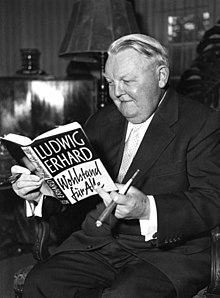Prosperity for All (book)
Prosperity for All is a book published by Ludwig Erhard and "edited" by the economist Wolfram Langer as a ghostwriter . It was published in 1957. In this popular science title, the then Federal Minister of Economics of the ruling CDU presented his ideas on the social market economy .
content
In his work Erhard formulates the goal of bringing prosperity to broad social classes . Erhard is convinced that only a free economy can create prosperity for everyone. This free economy must be protected from state interference as well as from cartels and monopolies .
The traditional situation of a thin upper class facing a broad lower class must be overcome. He sees competition as a means for this :
In this way I wanted to have all doubts removed that I was striving for the implementation of an economic constitution that could lead ever wider and wider strata of our people to prosperity. The starting point was the desire to finally overcome the old conservative social structure through broad mass purchasing power. This traditional hierarchy was characterized on the one hand by a thin upper class, which could afford any consumption, and on the other hand by a quantitatively very broad lower class with insufficient purchasing power. (...)
The most promising means of achieving and securing prosperity is competition. It alone leads to allowing economic progress to benefit all people, especially in their function as consumers, and to dissolving all advantages that do not result directly from higher performance. (...) On the way through competition - in the best sense of the word - a socialization of progress and profit is brought about and in addition the personal striving for achievement is kept alive.
reception
The title of the book Prosperity for All has become a popular slogan. Thomas Strobl writes in the series The Future of Capitalism in the FAZ :
“Prosperity for all” - behind this model, all of Germany once gathered, not only in party pamphlets and political Sunday speeches, but also in the real world. That was at a time "which was able to lead ever wider and wider layers of our people to prosperity," as the political father of the social market economy , Ludwig Erhard, had set himself as his goal. Erhard's calculation was quite simple: Politicians only have to ensure that the cake grows, then a correspondingly larger piece of it would fall away for everyone.
In 2011, Sahra Wagenknecht took up in her book Freedom instead of Capitalism in the chapter The Broken Promise of Ludwig Erhard Ludwig Erhard's promise of prosperity for all based on his theory. In it she criticizes an "economy of the completely free market" and refers to a tradition of this criticism in the ordoliberalism represented by Erhard .
expenditure
- Ludwig Erhard: Prosperity for everyone . Econ Verlag , Düsseldorf 1957. ISBN 978-3-86647-344-7 .
Web links
- Full text as pdf
- Werner Bührer: The dream of “prosperity for everyone”. How up-to-date is Ludwig Erhard's program publication? In: Zeithistorische Forschungen / Studies in Contemporary History, online edition, 4 (2007) H. 1 + 2.
Individual evidence
- ↑ Peter Ranke: The triumvirate of the market economy. In: The time . November 29, 1963
- ↑ Dominik Geppert, Udo Wengst: Neutrality, Opportunity or Chimera ?: Concepts of the Third Way for Germany and the World 1945-1990. Oldenbourg Wissenschaftsverlag, 2005, ISBN 3486577026 , p. 23
- ↑ Ludwig Erhard: Prosperity for All, Econ-Verlag 1957, p. 7–8 archive link ( Memento of the original from August 22, 2011 in the Internet Archive ) Info: The archive link was automatically inserted and not yet checked. Please check the original and archive link according to the instructions and then remove this notice.
- ↑ Thomas Strobl: Prosperity for everyone is more than just a phrase. In: FAZ.net . May 5, 2009, accessed October 13, 2018 .
- ↑ Sahra Wagenknecht: Freedom instead of capitalism , How we get more work, innovation and justice, Eichborn, 2011, p. 12ff .; P. 29
